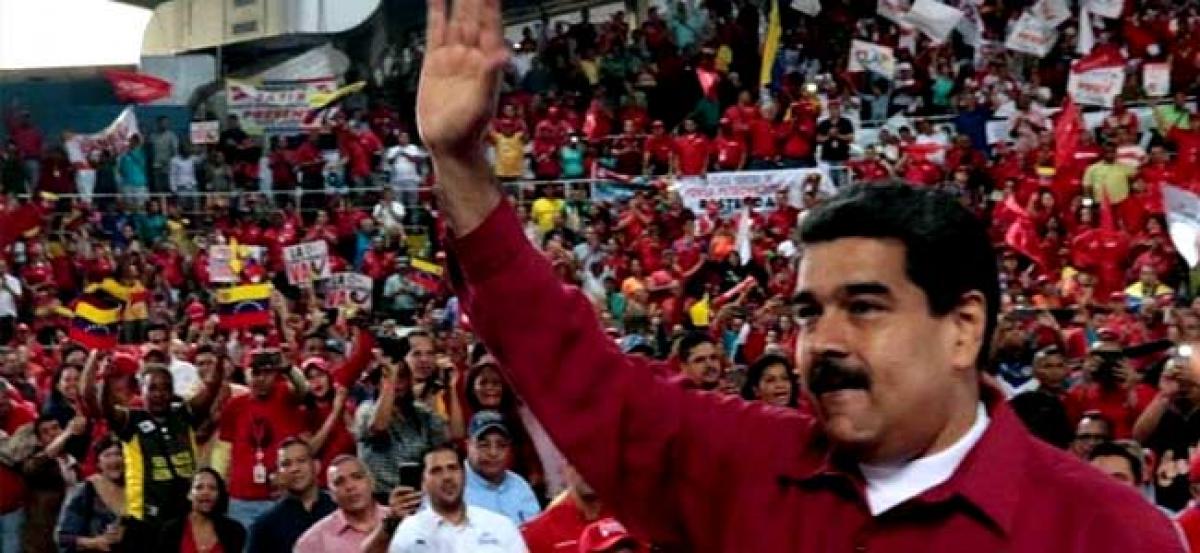Live
- Trailblazing Yakshagana Artiste Leelavathi Baipaditthaya No More
- Cong in direct fight with BJP on 45-50 seats in Delhi Assembly election: Sandeep Dikshit
- Vijay Diwas: Assam Rifles organises Half Marathon in Tripura
- Delhi HC to hear on Monday plea against suppression of CAG reports by CM Atishi
- Collaboration, innovation, PPP key to achieve 2047 goals: Jitendra Singh
- Portraits of National Leaders to be Unveiled in Karnataka Assembly Hall
- Kejriwal's claims on vision for development ridiculous: Delhi BJP
- One nation, one election need of the hour: Mukhtar Abbas Naqvi
- Educational Trips in South Kanara Put on Hold Following Murudeshwar Drowning Incident
- Karnataka Temple Embraces Mechanical Elephant for Cruelty-Free Ceremonies
Just In

Venezuela\'s opposition claimed a moral victory after massive abstention marred President Nicolas Maduro\'s re-election on Sunday, but with no clear strategy ahead for those who want change, the question loomed: where do we go from here?
Venezuela's opposition claimed a moral victory after massive abstention marred President Nicolas Maduro's re-election on Sunday, but with no clear strategy ahead for those who want change, the question loomed: where do we go from here?
Maduro, the 55-year-old successor to late leftist leader Hugo Chavez, hailed his win, with 68% of the vote, as a victory against "imperialism."
But the opposition coalition had contended that conditions did not exist for a fair vote and had asked supporters to boycott the election. Official figures showed a turnout of 46 percent - and critics said it was far lower - compared to 80 percent in 2013.
The opposition claimed a moral victory, tweeting pictures of near-empty voting centers and celebrating the condemnation of the vote by Washington and its Latin American allies.
Voting irregularities - such as pressure on state workers to support Maduro and the promise of a 'prize' for those who voted - vindicated the opposition's decision not to participate, the president of the opposition-led Congress, Omar Barboza, said in an address to the nation on Monday.
He said his group would now press for fair presidential elections at the end of this year. But, with Venezuela's electoral council stacked with Maduro loyalists, that appears to be a non-starter.
Asked by reporters what else the group was planning, he responded only that "further activities" would be announced and underlined his objective of "political change through constitutional means."
For many ordinary Venezuelans, there is a growing sense that Maduro's foes have run out of options.
Opposition supporters had been filled with optimism after the coalition swept to victory in 2015 congressional elections. That swiftly dissipated as the pro-government Supreme Court deprived Congress of any legislative power.
When the coalition organized a recall referendum against Maduro in 2016, authorities quashed it, citing alleged fraud in a signature drive.
For many a turning point came last year, when the opposition mobilized millions of Venezuelans in four months of protests in which some 125 people were killed - only for the demonstrations to gradually peter out without any meaningful change.
Widespread apathy and disillusionment with the opposition appear to have kept many Venezuelans away from polling stations on Sunday, rather than the boycott.
The opposition has "few tools available to exert pressure," said Risa Grais Targow at the Eurasia consultancy. With the population disengaged, social backlash would be minimal, "putting Maduro in a more comfortable position," she added.
Maduro's government has said the opposition repeatedly fails because it is led by out-of-touch scions of the elite who prefer to squabble over crumbs of power than address the needs of ordinary Venezuelans.
FOREIGN RESPONSE
Exhausted and depressed, many opponents of Maduro are emigrating as dire economic hardship makes their homeland increasingly unlivable - further depleting Venezuela of its anti-Maduro activists.
With political avenues seemingly closed, some of those left behind are clamoring for more extreme solutions - a social uprising, a military coup, or even foreign intervention.
"The Venezuelan people don't have weapons to fight so an intervention on humanitarian grounds is what we need," said driver Jarzenca Rodriguez, 42, as she smoked in front of a bank on a subdued Monday in Caracas.
While that remains a radical view, some Venezuelans are placing their hopes in an expected new raft of sanctions from Washington, the European Union and fellow Latin American nations.
Some think that could bring Maduro's already cash-strapped government to its knees, depriving him of support from the crucial armed forces and forcing a negotiated transition.
Others say the opposition shot itself in the foot by announcing the boycott and effectively rubber stamping Maduro's win.
"I'm pretty annoyed. Maduro got around 6 million votes. If they had not called for abstention it would have been easy to win with only 50% of registered voters," said Jemar Farfan, as he read a newspaper in a Caracas square.Barboza accepted on Monday that errors had been made.
"We haven't failed but we have made mistakes," said Barboza, a low-profile septuagenarian who, like much of the opposition leadership, has failed to connect with voters.

© 2024 Hyderabad Media House Limited/The Hans India. All rights reserved. Powered by hocalwire.com







